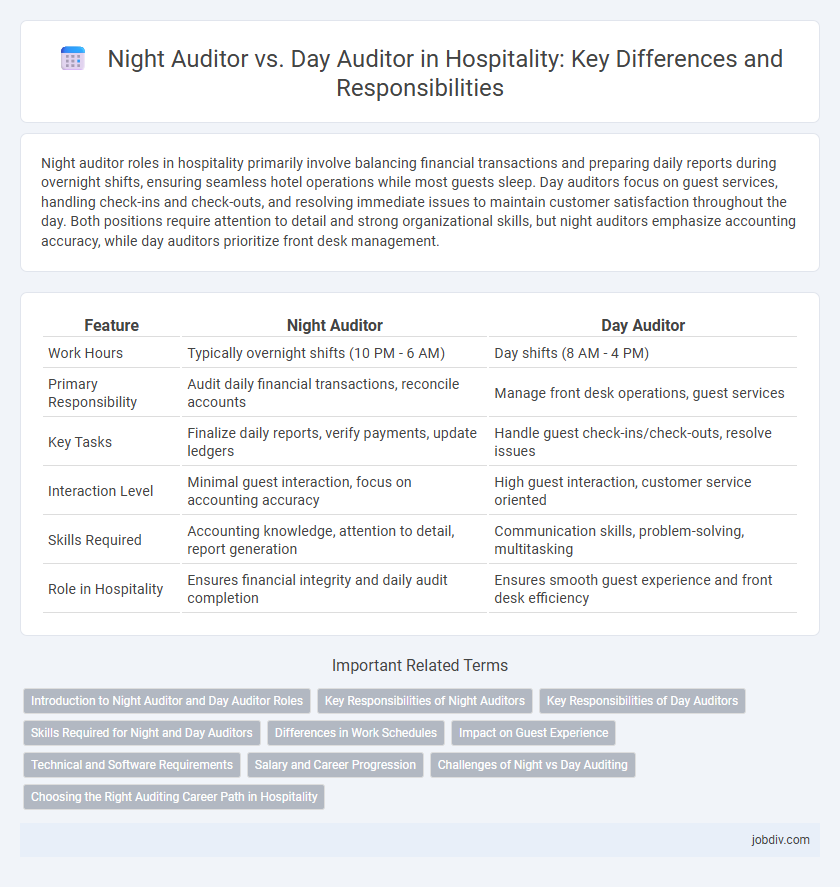Night auditor roles in hospitality primarily involve balancing financial transactions and preparing daily reports during overnight shifts, ensuring seamless hotel operations while most guests sleep. Day auditors focus on guest services, handling check-ins and check-outs, and resolving immediate issues to maintain customer satisfaction throughout the day. Both positions require attention to detail and strong organizational skills, but night auditors emphasize accounting accuracy, while day auditors prioritize front desk management.
Table of Comparison
| Feature | Night Auditor | Day Auditor |
|---|---|---|
| Work Hours | Typically overnight shifts (10 PM - 6 AM) | Day shifts (8 AM - 4 PM) |
| Primary Responsibility | Audit daily financial transactions, reconcile accounts | Manage front desk operations, guest services |
| Key Tasks | Finalize daily reports, verify payments, update ledgers | Handle guest check-ins/check-outs, resolve issues |
| Interaction Level | Minimal guest interaction, focus on accounting accuracy | High guest interaction, customer service oriented |
| Skills Required | Accounting knowledge, attention to detail, report generation | Communication skills, problem-solving, multitasking |
| Role in Hospitality | Ensures financial integrity and daily audit completion | Ensures smooth guest experience and front desk efficiency |
Introduction to Night Auditor and Day Auditor Roles
Night auditors manage hotel front desk operations during overnight shifts, combining accounting tasks with guest services to ensure accurate daily financial reporting. Day auditors handle morning and afternoon shifts, focusing on guest check-ins, reservations, and front desk management while monitoring daily transactions. Both roles require strong attention to detail and familiarity with hotel management systems to maintain seamless operations across different timeframes.
Key Responsibilities of Night Auditors
Night auditors handle end-of-day accounting, reconcile daily financial transactions, and prepare detailed reports for management review, ensuring accurate fiscal records. They oversee front desk operations during overnight hours, manage guest check-ins and check-outs, and address any guest concerns promptly. Night auditors also monitor hotel security and maintain communication with other departments to facilitate smooth operations.
Key Responsibilities of Day Auditors
Day Auditors oversee front desk operations during daytime hours, handling guest check-ins and check-outs, managing reservations, and addressing guest inquiries promptly. They ensure accurate posting of room charges, reconcile daily transactions, and prepare reports for management to maintain financial accuracy. Day Auditors coordinate with housekeeping and maintenance teams to guarantee seamless guest experiences and operational efficiency.
Skills Required for Night and Day Auditors
Night Auditors require strong analytical skills, proficiency in accounting software, and the ability to perform complex financial reconciliations during overnight shifts. Day Auditors need excellent customer service skills, multitasking abilities, and knowledge of front desk operations to effectively manage guest check-ins and resolve daytime issues. Both roles demand attention to detail, time management, and a solid understanding of hospitality management systems.
Differences in Work Schedules
Night auditors typically work overnight shifts, combining front desk duties with end-of-day financial reporting, ensuring accurate hotel accounting and guest service during late hours. Day auditors usually handle morning to evening shifts, focusing on balancing daily transactions, managing guest check-ins and check-outs, and resolving billing inquiries. The primary difference in work schedules lies in the nocturnal hours of night auditors versus the daytime operational focus of day auditors.
Impact on Guest Experience
Night Auditors handle end-of-day financial reconciliation while maintaining guest services during low-traffic hours, ensuring accuracy and readiness for the next day. Day Auditors focus on front-desk operations, addressing immediate guest needs and facilitating smooth check-ins and check-outs to enhance real-time satisfaction. Both roles critically impact guest experience by balancing operational precision with personalized service touchpoints.
Technical and Software Requirements
Night auditors require proficiency in overnight property management systems (PMS) like Opera or Protel, emphasizing automated report generation and batch processing of reservations. Day auditors rely heavily on real-time front desk software with integrated point-of-sale (POS) systems, such as Maestro or eZee FrontDesk, to manage live guest check-ins and financial transactions. Both roles demand expertise in accounting software for accurate ledger balancing, but night auditors prioritize end-of-day financial reconciliation tools to ensure data integrity before system resets.
Salary and Career Progression
Night Auditors in hospitality typically earn slightly higher salaries than Day Auditors due to overnight shift differentials, with average earnings ranging from $30,000 to $40,000 annually compared to $28,000 to $38,000 for Day Auditors. Career progression for Night Auditors often involves moving into supervisory roles or front desk management, leveraging their experience in balancing nightly financials and guest relations. Day Auditors usually advance toward administrative or operations positions, benefiting from daytime business interactions and broader management exposure.
Challenges of Night vs Day Auditing
Night auditors face challenges such as balancing front desk duties with end-of-day financial reconciliations during overnight hours when guest activity may be low but urgent issues still arise. Day auditors contend with higher guest interaction volumes, requiring efficient multitasking between processing transactions and resolving discrepancies in real time. Both roles demand strong attention to detail and time management to ensure accurate reporting and smooth hotel operations despite differing peak workload times.
Choosing the Right Auditing Career Path in Hospitality
Night auditors in hospitality handle nightly financial reconciliations and guest services during low-occupancy hours, focusing on accuracy and security, while day auditors manage daytime transaction processing and reporting, emphasizing operational efficiency and guest relations. Choosing the right auditing career path depends on individual preferences for work environment, with night auditors often working independently during overnight shifts and day auditors collaborating closely with front desk teams and management. Both roles require strong accounting skills and attention to detail but cater to different rhythms and responsibilities in hotel operations.
Night Auditor vs Day Auditor Infographic

 jobdiv.com
jobdiv.com